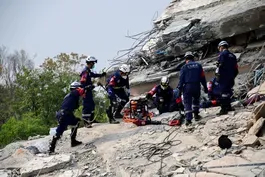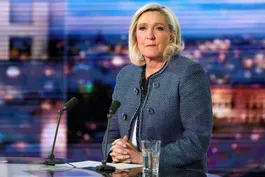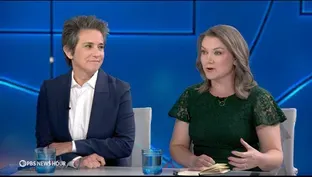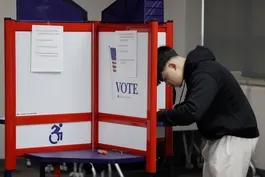
Examining claims tariffs will revitalize U.S. manufacturing
Clip: 3/31/2025 | 7m 42sVideo has Closed Captions
Examining Trump's claims that tariffs will revitalize American manufacturing
The impact of tariffs is starting to become real and more are on the way. One of the biggest questions around President Trump's approach is whether it can help revitalize American manufacturing. Economics correspondent Paul Solman breaks that down.
Problems with Closed Captions? Closed Captioning Feedback
Problems with Closed Captions? Closed Captioning Feedback
Major corporate funding for the PBS News Hour is provided by BDO, BNSF, Consumer Cellular, American Cruise Lines, and Raymond James. Funding for the PBS NewsHour Weekend is provided by...

Examining claims tariffs will revitalize U.S. manufacturing
Clip: 3/31/2025 | 7m 42sVideo has Closed Captions
The impact of tariffs is starting to become real and more are on the way. One of the biggest questions around President Trump's approach is whether it can help revitalize American manufacturing. Economics correspondent Paul Solman breaks that down.
Problems with Closed Captions? Closed Captioning Feedback
How to Watch PBS News Hour
PBS News Hour is available to stream on pbs.org and the free PBS App, available on iPhone, Apple TV, Android TV, Android smartphones, Amazon Fire TV, Amazon Fire Tablet, Roku, Samsung Smart TV, and Vizio.
Providing Support for PBS.org
Learn Moreabout PBS online sponsorshipWILLIAM BRANGHAM: The impact of tariffs is just starting to be felt just as more are on the way.
The markets just closed out their worst quarter in 2.5 years, and some businesses are warning how tariffs could hurt sales and their bottom lines.
This week, President Trump plans to announce a new set of tariffs on major U.S. trading partners.
That would be in retaliation for tariffs other trade barriers imposed on U.S. exports.
But one of the biggest questions about the president's approach is whether they can help revitalize American manufacturing.
Economics correspondent Paul Solman breaks that down.
DONALD TRUMP, President of the United States: This is the beginning of liberation day in America.
PAUL SOLMAN: So President Trump proclaimed in the Oval Office last week when adding 25 percent tariffs on U.S. auto imports.
And, on Wednesday, it's promised there will be more still.
DONALD TRUMP: We're going to charge countries for doing business in our country and taking our jobs, taking our wealth, taking a lot of things that they have been taking over the years.
They have taken so much out of our country, friend and foe.
And, frankly, friend has been oftentimes much worse than foe.
PAUL SOLMAN: And thus, says Mark DiPlacido, a policy adviser at pro-Trump think tank American Compass: MARK DIPLACIDO, Policy Adviser, American Compass: We need a transformational change in our economy.
And I think the administration is pursuing that.
PAUL SOLMAN: Part of that change, creating supply chains in America for Americans.
DONALD TRUMP: We shouldn't have supply chains.
We should have them all in the United States.
We have the companies to do it.
PAUL SOLMAN: But the main theme is tariffs.
The president and his team have cited very different reasons for imposing them.
DONALD TRUMP: They have allowed fentanyl to come into our country at levels never seen before.
This is retaliatory to a certain extent.
Millions of people flowed into our country through Mexico and Canada.
And we're not going to allow that.
This is going to be what pays down the $36 trillion in debt and all the other things.
PAUL SOLMAN: But the dominant case has been that tariffs will reindustrialize America.
What exactly the administration will do on liberation day, don't know yet, but the argument is, says DiPlacido: MARK DIPLACIDO: For 30 years, we have basically allowed other countries to distort their market, to subsidize their own markets at the expense of our market and keep our goods out.
PAUL SOLMAN: And then, on what would be a level playing field, firms operating in the U.S. will, and I don't mean this snarkily, make American manufacturing great again.
MARK DIPLACIDO: When companies realize the incentives have changed, that they're going to have to factor in tariffs for imports, and they're not going to be able to just import cheap labor also from other countries under the president's policies, these companies are going to be incentivized to invest in the education and training that our population needs to be successful.
PAUL SOLMAN: And become more productive.
Predictably, I asked a number of economists for a critique.
HA-JOON CHANG, University of London: In theory, it could work.
PAUL SOLMAN: That's University of London trade economist Ha-Joon Chang in the U.K.
But, he says: HA-JOON CHANG: It is going to take a lot of time, and you don't have that time.
You have run down the industrial base over the last four decades.
It cannot be built up in two years or whatever tariff policies that you have.
In the meantime, things will be very expensive, especially if you are putting tariffs on the main trading partners like Mexico and Canada.
And can people tolerate any more inflation?
PAUL SOLMAN: But if enough Americans think inflation is a price worth paying for a rebuilt industrial base and foreign firms relocate in the U.S.?
HA-JOON CHANG: Yes, people think that, but the trouble is that it's not just the factories.
If you really want these factories to be productive, you need workers with the right skills.
You need infrastructure that is needed for that particular industry.
You even need universities around it to do research in whatever the firm is producing.
PAUL SOLMAN: Back across the pond at the Harvard Business School, Professor Willy Shih agrees.
WILLY SHIH, Harvard Business School: Let's say you wanted offshore production from the U.S. to China.
You had to set up a new factory.
You had to hire the work force.
You had to train the work force.
You had to bring in suppliers.
You had to set up your logistics.
And what paid for that was, you got lower cost of product.
That's going from a high-cost country to a low-cost country.
Now, if you want to bring stuff from a low-cost country to a high-cost country, and you have to set up a factory and you have to hire the work force, and you have to train the work force and bring in your suppliers, what's going to pay for it?
Your product cost is going to be higher.
PAUL SOLMAN: And there's another major hurdle, say Shih and others, uncertainty, as President Trump keeps changing what he threatens.
WILLY SHIH: Because, with uncertainty, you can't plan.
Think about football, right?
Business is conducted on a playing field, where there are rules defined by the government and others.
Imagine if the rules changed every five minutes.
It's like, how would you play that game?
PAUL SOLMAN: Our last critic, Robert Zoellick, U.S. trade representative under George W. Bush, economic adviser under Bush I.
He spent his career negotiating tariff reductions.
But in today's economic environment, might there be advantages if America erects barriers and more nearly goes it alone?
ROBERT ZOELLICK, Former U.S. Trade Representative: We have got some advantages, but also then you have to ask, if we go it alone, what happens to all the farm production that we make in the United States that we sell abroad?
And in the case of North America, we're far more efficient because of the Mexican-Canadian-American supply chains that produce cars.
So if you put the types of tariffs that President Trump is talking about, you will increase the price of cars by $3,000 to $12,000 are the estimates.
Do people want that?
PAUL SOLMAN: Well, no, but I mean, I have talked to a number of people who say they will bring their plants here to America.
And that's the point, to create more jobs, more work here in America.
ROBERT ZOELLICK: So, the problem with Trump's approach is, it combines incoherence and protectionism.
And you have to look at both parts.
So the protectionism will add costs.
And then you also have the retaliation.
We tried this in the 1930s.
We raised tariffs to an average of 59 percent, and other people hit back.
We had a trade surplus, but we also had unemployment at 25 percent.
So it's a policy that reverses 70 years of America's international economic leadership.
PAUL SOLMAN: OK, the crux of the critiques, higher prices at home, maybe even a recession, plus policy uncertainty, while waiting for America to reindustrialize, who knows by when, if ever.
Mark DiPlacido's response?
MARK DIPLACIDO: We have a new president.
It's only been two months.
He's promised to make the most substantial changes to our economy in decades.
And that's going to come with some disruption, as he's indicated, and it's going to come with some uncertainty.
But I think, by the end of the spring, people are going to have a very clear idea.
What the president has been consistent on is saying, if you manufacture in America, if you produce in America, you are not going to have to pay these tariffs.
PAUL SOLMAN: And if we can provide enough homegrown workers, expertise, capital, we recapture our manufacturing edge.
But more manufacturing jobs, when even China is losing them to increased automation?
Yes, says DiPlacido, because U.S. firms will become more productive.
And that, he says, is what the administration is betting on.
For the "PBS News Hour," Paul Solman.
After Myanmar earthquake, China fills vacuum left by USAID
Video has Closed Captions
After devastating earthquake in Myanmar, China filling vacuum left by USAID's absence (9m 34s)
News Wrap: Le Pen banned from public office after conviction
Video has Closed Captions
News Wrap: Le Pen banned from public office in France after embezzlement conviction (4m 20s)
Scientists sound alarm on Trump's research funding cuts
Video has Closed Captions
Scientists sound alarm on Trump administration's dismantling of research funding (6m 44s)
Tamara Keith and Amy Walter on Florida, Wisconsin elections
Video has Closed Captions
Tamara Keith and Amy Walter on what this week's elections mean for Trump and Democrats (8m 29s)
Trump deports more immigrants amid battle with judiciary
Video has Closed Captions
Trump administration deports more immigrants to El Salvador amid battle with judiciary (7m 56s)
Wisconsin Supreme Court election highlights political divide
Video has Closed Captions
Wisconsin Supreme Court election highlights deep political divides in battleground state (6m 50s)
Providing Support for PBS.org
Learn Moreabout PBS online sponsorshipMajor corporate funding for the PBS News Hour is provided by BDO, BNSF, Consumer Cellular, American Cruise Lines, and Raymond James. Funding for the PBS NewsHour Weekend is provided by...

















